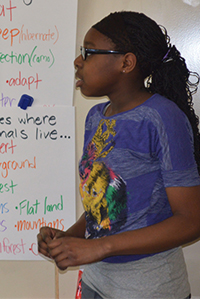During spring conferences at Kentwood Public Schools’ Bowen Elementary School, fifth-grader Mia Johnson told her mother, Stephanie Mitchell, what she loves about school, her academic and behavior goals, and what she’s still working on.
Instead of teacher Mary Campione updating Mitchell about her daughter’s progress while Mia sat and listened, Mia told her mom herself through a Powerpoint presentation. She outlined her goals, many she’s already met and some still under way.
“I will read more than 20 minutes a night and read interesting books,” she said, of working toward her self-challenge of reading at a high-school level.

When it comes to getting the most out of her education, Mia is owning it. It’s a trend catching on in classrooms as educators shift their focus from being the gatekeepers of students’ grades and test scores to putting the data into the hands of students to use as a constant metric for self-growth and introspection.
“The research says that if a kid is aware of where they are at, they will progress at a higher rate,” said Bowen Elementary Principal Blair Feldkamp. “Self-reported grades is the number-one ranked most effective best practice.”
The study Feldkamp referred to is by John Hattie, author of “Visible Learning,” who researches best instructional practices. Self-reported grades, according to Hattie, could be relabeled as student expectations. If educators know what students expect of themselves, they can help them raise those expectations above “safe-targets” students sometimes set for themselves.
At Bowen, it was the first year student-led conferences were held for all students. Feldkamp said he plans to continue them each spring when students have worked all year to hit targets set in the fall.
At Kentwood’s Discovery Elementary, fifth-graders have led conferences for their parents for several years, but in the past students were just summarizing what they’ve studied. This year, students include what they’re confident about, what they need to work on and their goals.
“It enables kids to tell their own stories about their own learning,” said Discovery Principal Deb McNally.

New Perspectives for Teachers, Parents, Students
Not all conferences go as smoothly as Mia’s, Feldkamp said, but even the difficult ones allow students to take ownership of their academics, and for parents to see what’s going on during the school day in a new way. And teachers learn to a greater degree what students are thinking. “It allows students to track their progress,” he said. “Allof a sudden they have a much higher level of investment in their own learning because they are working toward something. It was repeatedly stated by parents that having students being able to explain to them what they’re working on currently, and what they’re working toward, was powerful and meaningful.”
Teachers say students are stepping up to the opportunity to talk with their parents about how things are going for them at school. Families can then delve into reasons behind struggles or lack of growth. “It gives them more ownership,” Campione said. “The kids are excited to share with their parents, both their progress and their challenges…This gives parents the opportunity to see their child in a different light. Their child’s not just sitting next to them, quiet, while I talk. They are actually learning from their child, and for a parent, that’s got to be very powerful.”
Creating the Self-Assessments
What Kentwood fifth-Graders Presented During Conferences
|
The conferences look different at every grade level. In kindergarten through second-grade, students rate themselves on both academics and social-emotional skills. Kindergartners, for example, mark how they are doing with smiley-, straight- or frown-face stickers. At conferences, they tell their parents and teachers why they marked things as they did.
The process gets more complex for older grades. Third-through fifth-graders create student portfolios, setting goals at the beginning of the school year and working to meet them. Fifth-graders create PowerPoint presentations to summarize their standardized test data, district benchmark scores and behavioral and social goals.
What’s been striking, Feldkamp said, is how on-target students are with their self-evaluations.
“It was amazing the honesty they reported with. It’s different for me to call home (with a concern). The parent’s natural reaction is to be defensive. But when you have your child sitting across from you and they are reporting their progress, it’s much more valuable.”
Feldkamp said he thinks embracing student ownership has already resulted in school-wide growth. The Michigan Department of Education has designated Bowen Elementary as a Reward School for the 2014-15 school year for being in the top 5 percent of schools making the greatest gains in achievement.
Student ownership of grades and test-score data was also pinpointed as a way for schools to increase achievement by the Reading Now Network, the Region 3 initiative to increase third-grade reading proficiency to 80 percent or more. In schools with high-reading success rates, students used data to set goals.
Mia’s mother, Stephanie Mitchell, said hearing her daughter present was better than a normal conference.
“It makes the kids become more responsible for their learning, actions and social behavior, and I think it’s really good for them to be the ones that have to say ‘This is what I’ve done and this is what I need to work on,’ ” Mitchell said.
She also sees the benefit for students without much support at home.
“For them to have the chance to get up there and say something good about themselves, and to own that, and feel good about that, will really help them. For those who aren’t doing as well, maybe it will help them become more responsible.”
Brittany Hobson, mother to first-grader Adrian, said it’s meaningful to hear from her child about his school experience.
“It made it a lot easier and more interesting for me,” Hobson said. “It’s a lot better for me to hear from him, because that means I know he knows what he’s doing and what he needs to work on.”
CONNECT









